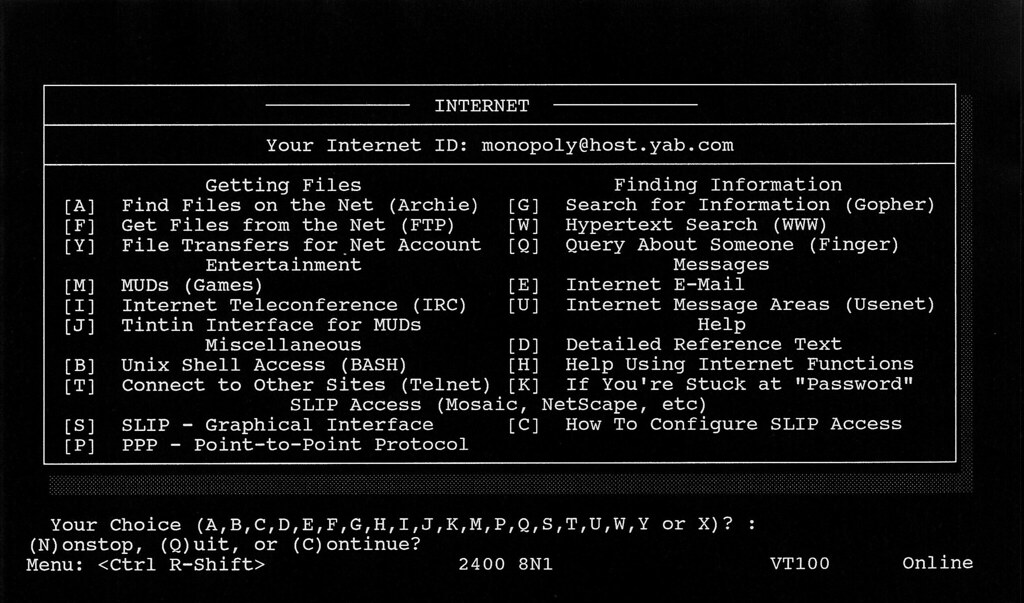Ever since Al Gore invented the internet (spoiler alert – he didn’t), there have been concerns about “bad actors” spreading misinformation and disinformation online: digital contaminants befouling a nascent “cybertopia.” I remember firing up Compuserve on my 512K Mac and dial-up modem and feeling a sense of limitless possibilities, but also wondering what could stop someone from just lying on the internet, and how would anyone know?

is licensed under CC BY-SA 2.0
Some of us once believed that the free exchange of ideas and enlightened online discourse could lead to a just and sustainable society. Today, I can only hope we are able to avert an all-out civil war and the collapse of our biosphere. While some are clamoring for increased governmental regulation of “objectionable” online content, others caution that it is a slippery slope to censorship, repression and limits to free expression.
How did we get here?
Interestingly, around the same time Senator Gore was supposedly coding the World Wide Web in his basement (see the previous spoiler alert), his then-wife Mary Elizabeth Gore, a.k.a. “Tipper,” was heading up the DC-based ad-hoc committee the Parents Music Resource Center.
A bipartisan group derisively referred to as “The Washington Wives,” the PMRC was formed to keep explicit lyrics, drug references, and adult content away from America’s children and to hold the music industry accountable for creating and distributing such content. These efforts were met with fierce opposition.
The most vocal opponent of this committee was the avant-garde musician Frank Zappa. However, the most earnest and eloquent criticism came from a most unlikely person, “America’s Boy Next Door,” singer-songwriter John Denver. The latter opined in Congressional testimony that these efforts were akin to censorship and would likely backfire since “that which is denied becomes that which is most desired, and that which is hidden becomes that which is most interesting.” He appeared on Capitol Hill on September 19, 1985.
So, why is a blog post about the control of media today looking back at US Senate hearings from 1985? Because that history serves as a clear example of what happens when the US government tries to impose limits on speech, either directly or by putting pressure on private companies and individuals. Too many lawmakers seek to score political points and burnish their reputations with hot-takes on hot-button issues rather than serving the public good and our Constitution.
For example, in the current arguments and proposals to reign in social media that are swirling around possible reforms to Sec 230 of the Communications Decency Act (CDA) of 1996, one can hear the echoes of 1985. The divisions are evident in these highly partisan times, yet the “something must be done” camp is decidedly bipartisan. Oddly enough, as a leftist and social justice advocate, I find myself in agreement with David French, the conservative author and commentator who argues that the government’s role in policing content on social media should be “minimal to none.” At a recent Harvard Federalist Society event, French offered a concise analysis of the situation we face:
“A lot of folks, broadly speaking, on the left want social media to be forced to moderate more. Lots of people on the right want social media to be forced to moderate less. Breach the firewall and what ends up happening … [is that] elections aren’t just for control of the House and the Senate and the presidency; they’re also for control of the moderation rules of Facebook and TikTok and Twitter, which seems to be the absolute last thing we need.”
There is no doubt that the media landscape deserves scrutiny and that entities and individuals must be held accountable for breaches of law or the public trust. However, we don’t need the government to play “content cops.” The government needs to sponsor the expansion of media literacy programs so that its citizenry is well-informed and engaged.
I urge everyone to read the transcript of John Denver’s Senate testimony. and I hope that there are some intrepid high school teachers who include this chapter of American history in their curriculum. He details his various run-ins with censors and their misinterpretations of his songs. Denver’s points are as salient today as they were in the Reagan Era and as clear as a blue mountain lake.
“Discipline and self-restraint, when practiced by an individual, a family, or a company, is an effective way to deal with this issue. The same thing when forced on a people by their government or, worse, by a self-appointed watchdog of public morals is suppression and will not be tolerated in a democratic society.”